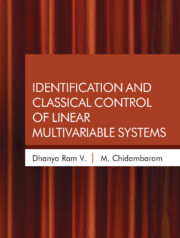Book contents
- Frontmatter
- Contents
- Preface
- Acknowledgements
- List of Abbreviations
- Notations
- 1 Models, Control Theory, and Examples
- 2 Identification and Control of SISO Systems
- 3 Introduction to Linear Multivariable Systems
- 4 CRC Method for Identifying TITO Systems
- 5 CRC Method for Identifying SISO Systems by CSOPTD Models
- 6 CRC Method for Identifying TITO Systems by CSOPTD Models
- 7 Identification of StableMIMO System by Optimization Method
- 8 Identification of Centralized ControlledMultivariable Systems
- 9 Identification of Multivariable SOPTD Models by Optimization Method
- 10 Identification of Unstable TITO Systems by Optimization Technique
- 11 Centralized PI Controllers Based on Steady State Gain Matrix
- 12 SSGM Identification and Control of Unstable Multivariable Systems
- 13 Control of Stable Non-square MIMO Systems
- 14 Control of Unstable Non-square Systems
- 15 Trends in Control ofMultivariable Systems
- Appendix A Identification of Unstable Second Order Transfer Function Model with a Zero by Optimization Method
- Appendix B For Chapter 3
- Appendix C For Chapter 7
- Bibliography
- Index
14 - Control of Unstable Non-square Systems
Published online by Cambridge University Press: 31 July 2022
- Frontmatter
- Contents
- Preface
- Acknowledgements
- List of Abbreviations
- Notations
- 1 Models, Control Theory, and Examples
- 2 Identification and Control of SISO Systems
- 3 Introduction to Linear Multivariable Systems
- 4 CRC Method for Identifying TITO Systems
- 5 CRC Method for Identifying SISO Systems by CSOPTD Models
- 6 CRC Method for Identifying TITO Systems by CSOPTD Models
- 7 Identification of StableMIMO System by Optimization Method
- 8 Identification of Centralized ControlledMultivariable Systems
- 9 Identification of Multivariable SOPTD Models by Optimization Method
- 10 Identification of Unstable TITO Systems by Optimization Technique
- 11 Centralized PI Controllers Based on Steady State Gain Matrix
- 12 SSGM Identification and Control of Unstable Multivariable Systems
- 13 Control of Stable Non-square MIMO Systems
- 14 Control of Unstable Non-square Systems
- 15 Trends in Control ofMultivariable Systems
- Appendix A Identification of Unstable Second Order Transfer Function Model with a Zero by Optimization Method
- Appendix B For Chapter 3
- Appendix C For Chapter 7
- Bibliography
- Index
Summary
For unstable non-square multivariable systems, the Davison method (Davison, 1976) is modified to design single-stage multivariable PI controllers using only the SSGM of the system. Since the overshoots in the closed loop responses are larger, a two-stage P–PI control system is proposed. Based on the SSGM, a simple proportional controller matrix is first designed by the modified Davison (1976) method to stabilize the system. Based on the gain matrix of the stabilized system, diagonal PI controllers are designed. The performance of the two-stage control system (inner loop centralized P controllers and outer loop diagonal PI controllers) is evaluated and compared with the single-stage multivariable control system. Simulation results on two examples show the effectiveness of the proposed methods for both the servo and regulatory problems. A method is presented to identify the SSGM of a non-square multivariable unstable system under closed loop control. Effects of disturbances and measurement noise on the identification of SSGM are also studied.
Introduction
Control of unstable systems with time delay is a challenging task when compared to the stable systems. Non-square process has a greater number of inputs than outputs or a greater number of outputs than the inputs. Non-square multivariable systems with a greater number of inputs than outputs arise in chemical industries. Examples include vacuum distillation column unit with five inputs and four outputs (Treiber, 1984), a mixing tank with three inputs and one output (Reeves and Arkun, 1989) and a distillation column with four measured impurities and three manipulated variables (Treiber, 1984).
Studies on decentralized control of stable non-square multivariable systems have been reported by (Loh and Chiu, 1997). Ganesh and Chidambaram (2010) have reported the design of centralized multivariable controllers by an optimization method such as the GA. Delay compensator for non-square systems have been reported by Rao and Chidambaram (2006b) and Chen and Ding (2011). Xu and Shin (2011) have presented the design of self-tuning fuzzy logic controller for stable non-square systems. Sarma and Chidambaram (2005) have extended the method of Davison and the method of Tanttu and Lieslehto (1991) to non-square stable systems. Sarma and Chidambaram (2005) have presented that these simple methods for controller design based on SSGM give a good performance for the non-square stable multivariable systems also.
- Type
- Chapter
- Information
- Publisher: Cambridge University PressPrint publication year: 2023



